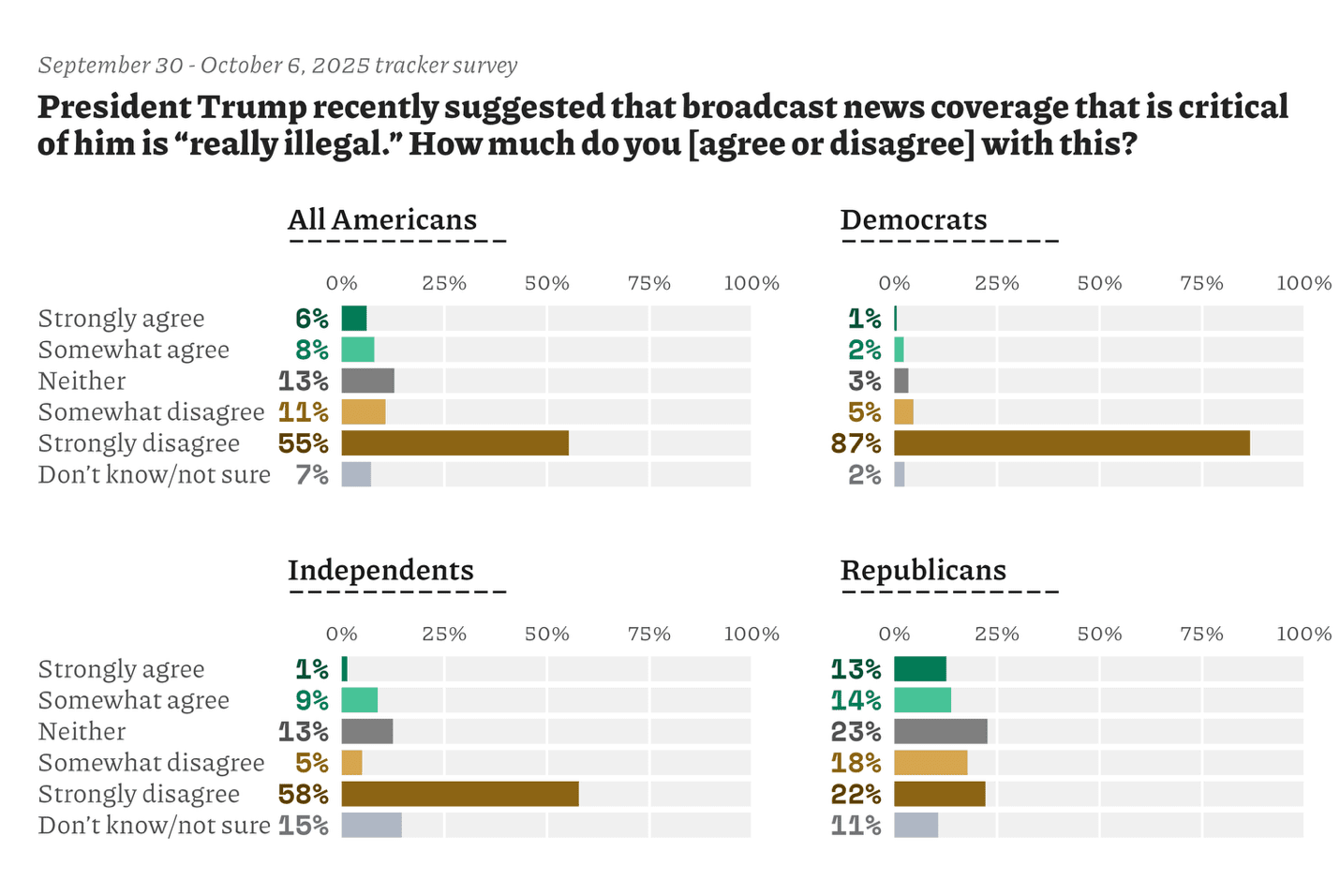Survey: Americans Don’t Believe Critical Press Coverage of Trump Is ‘Really Illegal’
In This Resource
Free speech and a free press are cornerstone values in America, as outlined in the First Amendment to the Constitution.
Throughout the nation’s history, presidents have often been scrutinized in the press—and have sometimes criticized the coverage they thought was unfair. But that’s what happens in a democracy: Journalists play a key role in providing transparency into the government’s actions and informing the public.
President Trump has taken a more extreme position, not just condemning press coverage that he considers to be critical of him, but declaring it “really illegal.”
The American people don’t agree. A recent survey from States United shows that nearly two-thirds of Americans disagree that broadcast news coverage that is critical of Trump is illegal, as he suggests. Large portions of Democrats (92%) and independents (63%)—joined by a substantial portion of Republicans (40%)—disagree with the president.
Just 14% of Americans either strongly or somewhat agree with the president’s position—a stance shared by only about a quarter of Republicans (27%).
The president made those remarks to reporters from the Oval Office in September, claiming journalists were fabricating coverage that was critical of him. He further threatened to take away broadcast licenses from news outlets—a threat the administration has continued to use against ABC, NBC, and PBS.
Trump has successfully secured multimillion-dollar settlements from CBS and ABC after he sued them for coverage he said was inaccurate. But he has not relented in his attacks on the press, most recently suing The Wall Street Journal for $10 billion.
The president has sought to coerce media companies into publishing more favorable coverage. In February, he removed The Associated Press from the White House press pool for refusing to call the Gulf of Mexico the “Gulf of America,” even though it went against the outlet’s policies.
The Pentagon also attempted to force media outlets to sign a press policy that prohibited them from publishing or soliciting any information that the Defense Department had not approved. Dozens of reporters from every major news outlet refused to sign and relinquished their press credentials, including Fox News, The New York Times, Newsmax, and The Washington Post.
While Trump continues to assail the free press, it’s clear Americans do not support those attacks.
- Nearly two-thirds (66%) of Americans disagree with the president’s position that broadcast news coverage of him that is critical is “really illegal.”
- There is broad disagreement among Democrats (92%) and independents (63%), and widespread disagreement among Republicans (40%).
- The number of Americans who somewhat or strongly agree that critical press coverage is illegal is small: Just 14%.
Few Americans agree that broadcast news coverage of Trump that is critical is illegal. Just 14% say that they somewhat or strongly agree while nearly two-thirds (66%) express some level of disagreement—mostly strong disagreement. Nearly all Democrats (92%) and almost two-thirds of independents (63%) say that they disagree. Once again, most of this is strong disagreement. Opinion among Republicans differs from Democrats and independents. While 27% of Republicans say that they agree, a plurality of 40% say that they disagree and another 34% say they neither agree nor disagree or say that they don’t know.

These data are taken from a States United survey based on 1,515 interviews conducted on the internet of U.S. adults. Participants were drawn from YouGov’s online panel and were interviewed from September 30 – October 6, 2025. Respondents were selected to be representative of American adults. Responses were additionally weighted to match population characteristics with respect to gender, age, race/ethnicity, education of registered voters, and U.S. Census region based on voter registration lists, the U.S. Census American Community Survey, and the U.S. Census Current Population Survey, as well as 2020 presidential vote. The margin of error for this survey is approximately ± 2.8 percentage points, though it is larger for the analysis of partisan subgroups described above. Therefore, sample estimates should differ from their expected value by less than the margin of error in 95% of all samples. This figure does not reflect non-sampling errors, including potential selection bias in panel participation or measurement error.
In keeping with best research practices, we classify independent voters who reported “leaning” toward either the Democratic or Republican parties as partisans. Therefore, we define “independents” as those respondents who professed no partisan attachments whatsoever.